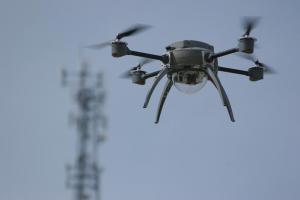Drones, Surveillance and the LAPD
The question is not whether, but how unmanned aircraft systems should be used by the police.
LOS ANGELES, CA, UNITED STATES, December 1, 2017 /EINPresswire.com/ -- A few weeks ago, I wrote about my ambivalent feelings about the Los Angeles Police Department’s use of stingray technology to intercept cell phone calls.
Since then, another debate about technology and police work has surfaced: the LAPD is going to begin flying drones.
Although the use of drones by the military in war is by now an accepted fact, the police exist to keep the peace. They therefore must abide by a more stringent set of ethical standards that includes the Fourth Amendment, which protects American citizens from “unreasonable searches and seizures.”
Thus far, the primary use of drones in police work has been surveillance. That puts the remote-controlled devices on a collision course with the Fourth Amendment, as they offer the police the possibility of watching people in ways that have not been available until now.
This past Tuesday, the Police Commission approved a one-year trial program that authorizes the Los Angeles Police Department to use drones in limited circumstances, such as hostage situations and searches for missing people in inaccessible areas. Both of these are cases that would involve considerable danger to officers attempting to perform comparable surveillance. As a measure intended to prevent abuses, any use of drones will require approval from high up in the chain of command. (You may recall that there is a similar requirement for the use of stingrays to intercept cell phone signals.)
Note that the two examples above skirt the question of search warrants: neither situation constitutes a search in the Constitutional sense of the term.
This proposal for this use of drones has met with objections from the ACLU, and especially vociferous ones from the Stop LAPD Spying Coalition. These groups see nothing but danger in any civil deployment of drones, and would like to see the entire discussion tabled permanently.
The chief argument against even the limited use of drones the Police Commission has authorized is mission creep: the way in which permitting something for one purpose will slowly lead to its use in other situations. The Police Department may be fully sincere in its current plans for employing drones, but, once they’ve started to use the technology, it’s pretty much inevitable that they will begin using it in other ways. That will increase the possibilities for surveillance the LAPD has at its disposal, and that could easily lead to violations of the public’s Fourth Amendment rights.
This mission creep phenomenon can lead even further, into the frankly disturbing area of using drones as weapons. Although the Department has stated that it has no intention of weaponizing drones, there can be no question that allowing them to use these “small unmanned aerial systems” in one fashion takes us one step closer to remote-controlled devices spraying rubber bullets and tear gas, as is already legal in North Carolina. The drones could even be used to kill a suspect. (It can happen: remember the robot the Dallas Police employed to kill the man who had killed five officers in a mass-shooting incident last year.)
This past May, the LAPD itself showed how law enforcement technology can gradually become weaponized. When the Department purchased its first helicopter, it was intended to help with traffic control. This year, a SWAT officer in a helicopter shot and killed a suspect on the ground. In other words, a flying device acquired for other purposes has become a weapon.
The Stop LAPD Spying Coalition makes some valid points, but it also comes up against the reality that the technology exists, and that it’s inevitable that it will be adopted by more and more law enforcement agencies. Sooner or later, that’s going to include the Los Angeles Police Department. (It already includes the Los Angeles County Sherriff’s Department, which has been flying a drone since January of this year.)
The question is not whether, but how unmanned aircraft systems should be used by the police. The technology is still new and largely untested in the field, which is both a plus and a minus as far as intelligent regulation is concerned. The downside is that it is difficult to regulate something that hasn’t been used much. The upside is that having regulation in the discussion this early in the game will ensure that it won’t be playing catch-up to the technology, as has happened in so many other areas. The LAPD has a chance to do this right. If they listen to the concerned citizens’ groups, and if they appreciate responsibility that comes with having such powerful technology at their disposal, we could have a model surveillance drone program here in Los Angeles. We shall see what comes of this one-year trial venture.
Surveillance is a big part of any private investigator’s job. While we don’t employ drones at John A. DeMarr PI (nor do we expect we ever shall), we believe in keeping abreast of all the developments in surveillance technology. If you are in need of surveillance of a person or a place, please don’t hesitate to call us at 877-433-6277.
John DeMarr
John A DeMarr, P.I.
877 493 3463
email us here
Legal Disclaimer:
EIN Presswire provides this news content "as is" without warranty of any kind. We do not accept any responsibility or liability for the accuracy, content, images, videos, licenses, completeness, legality, or reliability of the information contained in this article. If you have any complaints or copyright issues related to this article, kindly contact the author above.


